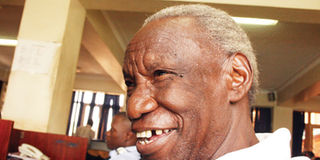UOC founder Obura in awe of Kiprotich

Obura speaking to during the interview. Photo by Yusuf Muziransa
Like some Ugandans, if not most, Sev Obura’s hopes in Team Uganda at the just ended London Olympics were in Moses Kipsiro and, to some extent, Dorcus Inzikuru. The 76-year-old had even given up on watching the race when Stephen Kiprotich beat his two Kenyan competitors to Uganda’s only second Olympic gold medal in 40 years.
“I first heard it (the golden news) on BBC Radio…,” said Obura, whose excitement upon Kiprotich’s win saw him dash from Naguru home to Monitor Publications headquarters in Namuwongo on Monday to share the joy of someone he admits not knowing before Sunday.
“…I could not believe the news. Then I had to run to TV to at least catch the highlights. Fortunately I watched the highlights and up to now I cannot believe it. “The boy has delivered us. Forty years without an Olympic medal and a boy born in 1989 comes up to win today…unbelievable.”
When the late John Akii-Bua won Uganda’s first gold medal at the 1972 Munich Olympics, the body in charge of coordinating the Commonwealth, Olympics and All-Africa Games – the Uganda Olympic Committee (UOC) - was three years from being formed.
Obura, together the late Maj Francis Nyangweso, among others were to found the UOC as the Uganda National Olympic Committee (UNOC) in 1975 and since then the country’s only Olympic gold medal – before Sunday – had been John Akii-Bua’s 400m hurdles title at the 1972 Munich Games.
“Now even if I die at least I have seen a gold medal winner in Olympics under the UOC I helped form,” said Obura. “But to tell you the truth, I only knew that if we were to win any medal, it had to come from Kipsiro or Inzikuru.”
Kipsiro is a double gold medalist in 5,000m and 10,000m at the 2010 Delhi Games while Inzikuru is a gold winner in 3,000 steeple chase at the 2005 World Championships in Helsinki, Finland and the 2006 Commonwealth Games in Melbourne, Australia.
But Inzikuru failed to progress from her race while, after faltering in 10,000m, Kispiro could not only finish last in the 5,000m finals. Now Obura, who qualified for the 1960 Rome Games as a long jumper but was left behind because of his diminutive stature, and 1964 Tokyo Games but opted to stay home writing his A’ Level examinations at St Mary’s College, Kisubi, wants to know the champion, to meet the champion.
“I’m still shocked but I’m also very excited,” poured out Obura, “I want to meet the boy. I will be at the airport when the team arrives. We want to give him an arousing welcome.”
But just like the rest of the country, Obura, is not happy with government funding, or none of it, of sports in general, a point highlighted in the run-up and during the London games.
“It’s true government has not done enough,” said Obura, “And I can tell you the likes of Kipsiro, Inzikuru and now Kiprotich are winning not because of anything from government, but because they are special, because they were born with that special talent and they work hard.
“Now imagine if these special talents were nurtured well and government thrown all its weight behind them? We should concentrate on nurturing talent just how Kenya are doing to their athletes. Kiprotich and Team Uganda arrive this morning.




